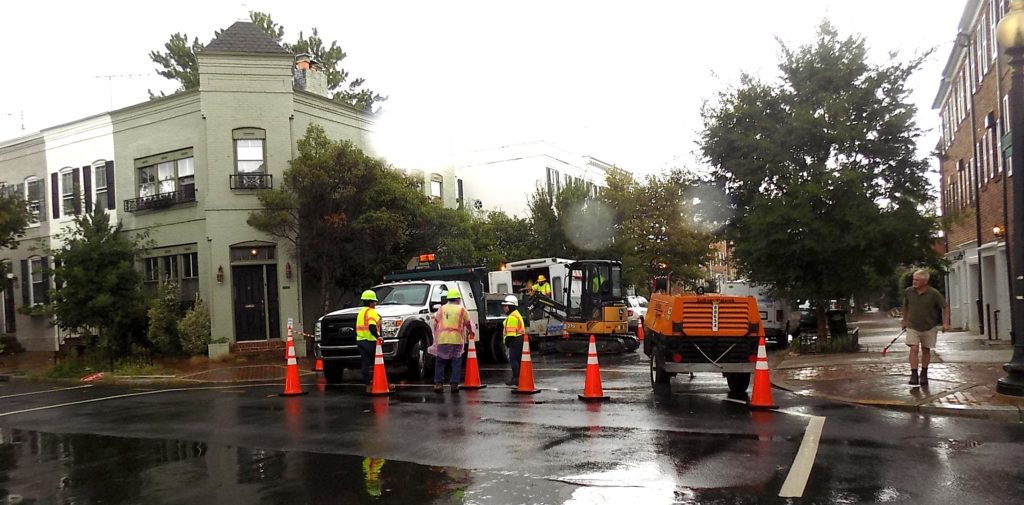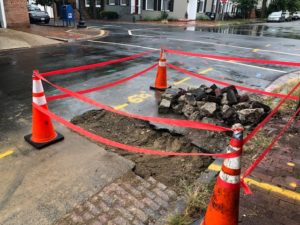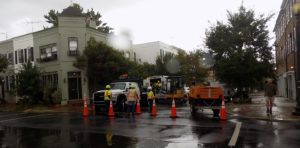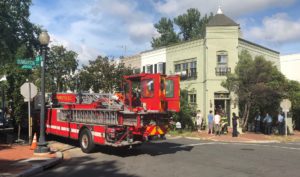Gas Leaks, Explosions ‘Not Unusual’
By • September 17, 2018 0 1367

The photos last Thursday, Sept. 13, were chilling. Dozens of homes in the Boston suburbs suddenly exploded from unknown gas leaks caused by an aging pipe infrastructure. Some 40 homes were immediately engulfed in fire. One teenager was killed. More than a dozen persons were injured. More than 8,000 residents were evacuated from their homes.
By Friday, Sept. 14, residents were being allowed back in their homes. Many expressed hesitancy, even fear to turn the gas and electricity back on. Boston authorities are investigating its old gas pipelines but assure residents they are safe.
Meanwhile in Georgetown, on Sunday Sept. 16, at around 3 p.m., residents at the corner of Dumbarton and 28th Streets were frightened by loud knocking on the door by firefighters.
“A gas leak had been detected by a passer-by and they urged us to turn off the gas,” said one of the house’s occupants, Josh (who refused to give his last name). “We didn’t notice the gas smell until we got outside and now it’s quite strong.”
On Sunday evening, Washington Gas Light Company workers and its contractors began tearing up the street. By Monday morning, Sept. 17, Evan Sheres wrote on the East Village Next Door website: “Looks like they found the source of the leak of the pipe leading to our house and will be working on this during the day tomorrow. Will have traffic control and no parking signs on Dumbarton between 28 & 27th Streets. We heard the pipe that they dug up leaking ourselves. Still no word to the community from Washington Gas.”
“With the aftermath of last week’s gas pipeline-related fires and explosions in the Boston suburbs, when will our community leaders do something about the continued lack of communication, accountability, and transparency by Washington Gas Light?” wrote Edward Segal, a neighbor who has been concerned about gas leaks in Georgetown for years. “Our own gas-related issues, questions and concerns continue to be ignored.”
“We investigate explosions all over the country,” Mark McDonald, president of NatGas Consulting in Boston told the Boston Globe last week. “The public would be shocked to know how common they are. Most incidents can be traced to several common causes. Aging infrastructures, incorrect installation or third-party damage are the most common.”
The sporadic fires in Lawrence, Andover and North Andover, Massachusetts, were likely the result of excess amounts of natural gas coursing through the region’s old pipes. “It appears to be an over-pressurization of the entire system,” McDonald said. “It is actually quite an uncommon cause.”
Thousands of gas leaks in Washington, D.C., had been found to be responsible for $15 million to $20 million in damage to trees, according to a 2011 study done by natural gas safety expert Robert Ackley of Gas Safety, Inc., in Southborough, Massachusetts.
In August 2017, Segal hosted Ackley in Georgetown for three days to update his research specifically in Georgetown using the cavity ring-do spectroscopy equipment. It detects and documents methane in parts per billion and tags each reading with global positioning coordinates.
Ackley’s report just came out this week. “The good news is most of the leaks detected are not necessarily explosion hazards for buildings. The bad news is no community can afford to be lulled into a false sense of confidence about the safety of its gas pipelines.”
Neverthless, Segal is frustrated by a lack of feedback about the situation.
“I am fed up,” Segal told the Georgetowner. “I’ve made complaints about the lack of transparency for going on three years now to all the proper public agencies and get no responses. Last week, suddenly a gas company contractor was again measuring the street in front of his home that they had torn up for months last year to repair some pipes, Segal said. “He told me that they have to fix it all again.”
At the request of the Georgetowner, however, the Washington Gas press office answered within hours: “Washington Gas received a report of a gas odor on Sunday afternoon. We responded to the scene immediately. We investigated the area, worked to make sure that gas was off and the area was safe and determined that the older service line should be replaced. Crews are on site to replace the service line.”




